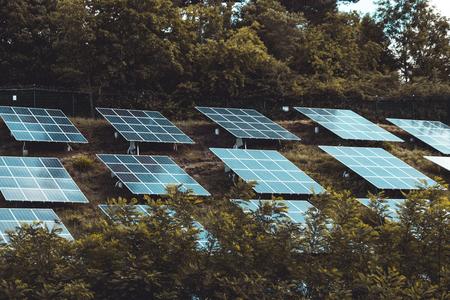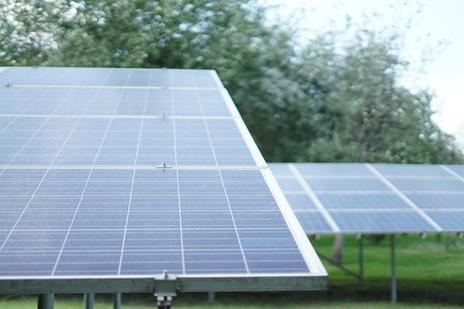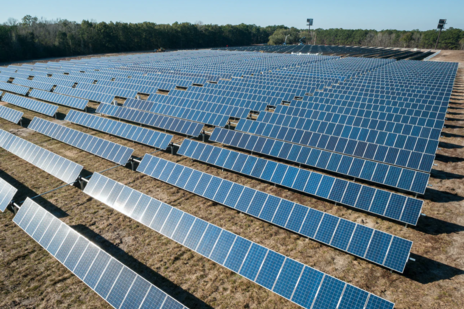Earlier this week, we shared insights into how at least 38 RE100 members were accounting for 100% of their US electricity needs with renewables by the end of 2019. Our feature considered the innovative projects and mechanisms which played a role in their success, and the barriers and challenges they faced in getting there.
These 38 members hail from a diverse cross-section of industries*, and together represent a total of over 12 TWh of consumption - more than the electricity used by the entire state of Maine in 2019.
Some of them have likewise achieved their overall RE100 commitment of procuring 100% renewable electricity for their worldwide operations by the end of 2019; others are still working toward their global RE100 pledge, with their success in the US representing an important milestone.
RE100 members are global corporate leaders with deep commitments to sustainability and combating climate change. The 38 member companies who have already accounted for 100% of their US electricity needs with renewables are not resting on their achievement, but rather continue to innovate to further reduce their emissions and accelerate our transition to zero-carbon energy grids.

We surveyed these members about their journey to 100% in the US. Among the steps they are now taking to go "Beyond 100%," we heard:
Engaging along supply chains and with peers
- Many of these members, such as Biogen, IKEA US, Signify, and Voya Financial, are looking beyond their own operations to engage with their suppliers and partners on climate. Pathways for supply chain engagement include encouraging suppliers to establish, measure, and disclose their own carbon reduction strategies, and to begin to transform their suppliers' entire operations to renewables.
- Amalgamated Bank mentioned working to influence their peers as well, encouraging others in the finance sector to measure and report the Scope 3 emissions of their investments and loans. They also financed the development of a major residential solar project, choosing renewables not only for their own operations but supporting their development for the US.
- Goldman Sachs highlighted the need for more innovation in how to decarbonize along value streams, in terms of emission accounting methods and capacity building among the array of impacted stakeholders, and moreover the need for large companies and sustainability leaders to collaborate on the issue.
- Swiss Re and Microsoft additionally mentioned the need for Scope 3 emission targets to consider not only upstream along product supply chains but also downstream as well, with points of sale, customers, and end of product life all potential points for emission reductions.
"Our 100% renewable electricity approach is one of the most important steps on our journey to become carbon neutral by 2025."
"Our 100% renewable electricity approach is one of the most important steps on our journey to become carbon neutral by 2025."
Connecting with employees and the community
- The COVID pandemic reduced the electricity consumption of many corporations, whose offices sat empty while employees worked from home. But RE100 members did not reduce their commitment to sustainability accordingly. For example, in late 2020, Biogen partnered with Arcadia to provide a quick, easy, and free way for their employees to sign up to 100% renewable electricity anywhere in the US, with a target for all employees to use 100% renewable electricity at home by 2030.
- Many members also reported going beyond simply procuring renewables for their own operations to include a lens of environmental justice, and working to ensure that their renewable projects have a positive impact in the communities where they operate. Bank of America, for instance, has announced ten agreements in the US, totalling 200MW, for offsite solar projects located in low-to-moderate-income communities, all of which help support jobs, clean energy access and more sustainable communities.

Vanessa Miler Fels, Director of Energy Innovation and Impact, Microsoft, said:
"Companies committing to 100% renewable energy send a critical demand signal, and corporate PPAs have played a key role in furthering the transition to zero-carbon energies. Looking ahead, two key things: how do we grow from a few hundred companies committed to 100% renewable energy to thousands and more; and how do we continuously maximize the environmental and social impact of corporate procurement."
Increasing the decarbonization of corporate choices
- RE100 members are at the forefront of corporate emission reductions, and multiple members cited a movement to maximize the carbon avoidance offered by their electricity procurement decisions, rather than purely purchasing based on cost.
- RE100 members including but not limited to Goldman Sachs, Hudson Pacific, IKEA, ING, Interface, Microsoft, QBE, Royal Philips, Signify, Steelcase, Swiss Re, The Estée Lauder Companies, Workday, Voya Financial and others, all mentioned that they are continually moving in this direction, assessing for example where PPAs and on-site projects will be feasible for their operations, thereby bringing new renewable capacity online through long-term and impactful sourcing agreements; many of these members reported having invested in PPAs, vPPAs, or on-site solar projects already.
- Other similar efforts mentioned by members include the introduction of internal carbon prices and restorative sourcing models, investment in batteries and energy storage technology, pursuing digitization and 24/7 clean energy, and considering the carbon footprint of business travel and employee commuting, including by supporting electric vehicle technologies.

"Philips committed to becoming carbon neutral in our operations by 2020 during the COP 21 UN Climate Conference in Paris. The Power Purchase Agreement we closed in the USA was our first major step to delivering on that commitment."
"Philips committed to becoming carbon neutral in our operations by 2020 during the COP 21 UN Climate Conference in Paris. The Power Purchase Agreement we closed in the USA was our first major step to delivering on that commitment."
RE100 members are some of the world's largest companies, and they are all committed to using their power for positive change, including by influencing among their sectoral peers, along their supply chains, and within the communities where they operate.
Many of them have set overall Net Zero goals, and/or have joined the Science-Based Targets Initiative, ensuring that the world is on track to staying below 1.5C of global warming, in accordance with the scientific consensus. Earlier in 2020, many RE100 members publicly signed on to We Are Still In, signalling private sector support for the US rejoining the Paris Climate Agreement, which the Climate Group celebrates has now occurred.
38 major global corporations, with a total of 12TWh of consumption, are proof of what is possible for a sustainable private sector in the US today, having reported to the RE100 that at the end of 2019 they were accounting for 100% of their US electricity demand with renewable electricity.
"The world increasingly faces the challenges posed by climate change. The time to act is now. We already achieved carbon neutrality for all our global operations earlier this year and we source 100% renewable electricity. Now we are committing to double the pace we reach the Paris Agreement over our value chain by 2025."
"The world increasingly faces the challenges posed by climate change. The time to act is now. We already achieved carbon neutrality for all our global operations earlier this year and we source 100% renewable electricity. Now we are committing to double the pace we reach the Paris Agreement over our value chain by 2025."
To celebrate the achievement, RE100 and sponsor Enel Green Power hosted a webinar on January 26th featuring four of these members, Goldman Sachs, Microsoft, Swiss Re, and, Workday, which looked more deeply at their journey to 100% in the US, and articulated what they see up ahead for corporate sustainability.
Highlights from the discussion include:
- All of the panelists agreed that not all renewable procurement options are created equally in terms of the emission reductions they offer. They are all now looking beyond merely price to consider the most impactful sourcing options available, and are adding an environmental justice and social equity lens into their calculations of impact.
- Internal carbon prices were cited by all four companies as being key to their success. As Swiss Re pointed out, any company which is paying any sort of premium for renewable electricity already, or for any other more sustainable options, is already operating with an internal price on carbon, even if they haven't officially calculated and codified it.
- Finally, Microsoft emphasized the need for flexibility in any corporate sustainability strategy and renewable procurement plan. Technologies, regulations, and market instruments will all continue to evolve, and senior leadership should be comfortable with some uncertainty about the path to long-term carbon neutrality.
*RE100 members who had accounted for 100% of their electricity demand in the United States with renewables, as of the end of 2019, include: Amalgamated Bank, Atlassian, Aurora Organic Dairy, Bank of America, Biogen, Burberry, Elopak AS, Goldman Sachs, Hudson Pacific Properties, IKEA US, ING, Interface, Logitech, McKinsey & Company, Microsoft, QBE Insurance, Royal Philips NV, SAP America, Inc., Signify, Steelcase Inc., Swiss Re, TD Bank, The Estée Lauder Companies, VMware, Voya Financial, Workday, YOOX NET-A-PORTER

Jennifer Keesson, Sustainability Manager, IKEA US, said:
"The challenges we face are huge; but from our history, we know that challenges can become opportunities and the source of great innovations. That's why we remain optimistic. We are still only at the beginning of this exciting journey, and we invite everybody to join. Together, we can turn the planet into the home we all want."






